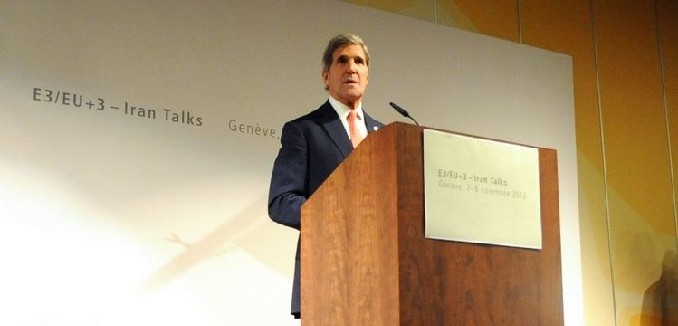Secretary of State John Kerry will brief Senators tomorrow on the administration’s efforts to secure an interim agreement with Iran regarding Tehran’s nuclear program, which this weekend floundered after Iran reportedly refused to yield on demands that global powers recognize its “right” to enrich uranium. Senators have indicated that they will wait for the briefing before advancing on new sanctions legislation.
Analysts, U.S. lawmakers, and journalists have consistently rejected Iran’s claim that it has such a right under the Non-Proliferation Treaty (NPT). A 2006 paper [PDF] presented to the French foreign ministry by Robert Zarate, now policy director at the Foreign Policy Initiative, went further, outlining how such a reading of the NPT generates inconsistencies and risks making the treaty unsustainable.
The collapse of the talks triggered worries that Iran was not ready to realistically address international concerns regarding its program, as well as calls for further financial pressure to change the regime’s calculus. The State Department’s approach to the talks has come under withering and sustained criticism since the weekend. with analysts and lawmakers insisting that U.S. diplomats gave away too much too easily.
Calculations conducted by the Foundation for Defense of Democracies (FDD) estimated that the offer being given to Iran would have restored roughly $20 billion to Tehran. Iran would have been allowed to continue enriching uranium and building centrifuges – which could have been activated at the end of the interim period, swamping whatever concessions Iran made in the meantime – and bolstering its plutonium complex at Arak.
Critics particularly focused on overeager signals sent by Washington.
The Daily Beast had revealed earlier in the week that the Obama administration had been quietly easing financial pressure since the election of Iranian president Hassan Rouhani. The result, according to Mark Dubowitz, executive director of the Foundation for Defense of Democracies, was that the administration ended up getting badly outmaneuvered. The Telegraph had already described a White House meeting that “ended with officials admitting that a ‘bad deal is better than no deal.'” Michael Doran, a senior fellow at Brookings, over the weekend blasted Kerry for “rush[ing] to Geneva when a deal wasn’t ready” and making the U.S. “consistently look too eager.” The Iranians may have been able to leverage U.S. eagerness. The Jerusalem Post reported on Saturday that the U.S. actually got pushed off the plan with which it came into the talks.
[Photo: U.S. State Department / Flickr]




